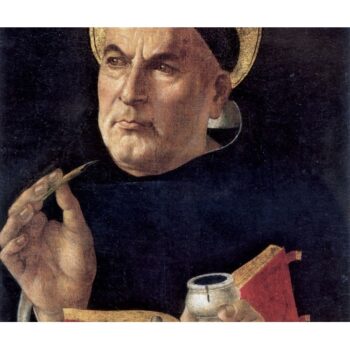Baruch Spinoza (1632-1637) is best known for identifying God with Nature. He does not see God as the transcendent creator of the world. Rather, he views him as the same as Nature itself. If the Axial Age philosophers and the religious thinkers who build on their work emphasize that the divine is separate from earth, Spinoza brings the divine back to earth. But his identification of God with nature cuts two ways. To some it appears to divinize a profane nature. To others it seems to degrade the divine nature.
Spinoza was born in Amsterdam into a Portuguese Jewish family, which had fled Spain for the Netherlands during the Spanish Inquisition. His was given an early religious eduction. But he was influenced by not only Descartes and Leibniz, but also by Machiavelli and Hobbes as well as Stoicism and various heterodox thinkers of his time. In 1656, at the age of 24, he was excommunicated from the Jewish synagogue in Amsterdam. Along with his rejection of the transcendent God, he rejected the immortality of the soul and any literalist understanding of the moral law having been imparted to Moses. These views, which would have been known to the synagogue, eventually appear in his writings.
Spinoza’s best-known work is his Ethics. Also influential is his pseudonymously published Theological-Political Treatise, which one critic characterized as “a book forged in hell by the devil himself.” In the Treatise Spinoza starkly criticizes the role of religion in politics and calls for a secular, democratic form of government.
The title of the work Ethics underlines the book’s main purpose. Spinoza wants to provide a view of ethics. However, his ethics and generally his system of thought has certain similarities to that of the Epicureans. Like the Epicureans, he thinks he must correct broad misunderstandings of God, nature, and the self. On the basis of a correct understanding of metaphysics, he can then construct his ethics.
In the first sections of the Ethics, he begins his critical reconstruction. His argument that there is only one substance is conveyed in various forms. One is that if God is infinite, then there can be nothing outside of God. He can have no limits or boundaries. This means there cannot be a world external to Him. The world must be contained as part of the infinite substance that is God. He offers a version of the following argument.
1) No two substances can share the same attribute or essence.
2) God is a substance that has (or is comprised of) infinite attributes.
3) To exist separately from God, any other substance would have to possess attributes or an essence that is different from one of the infinite attributes or essences of God, which is impossible.
4) Therefore, no substance can exist separately from God
Admittedly, to understand the first premise of the argument takes a bit of intellectual lifting. Spinoza concludes that everything that exists is a part of God. In his terminology, what the Aristotelians take to be separate substances actually exist as modes of God. They all in fact rely on God, but they can do so in different ways. Some modes are “infinite modes.” These include things like the laws of nature. Other modes are “finite.” These include the particular existences, that is individual people, animals, plants.
All things in nature, which are a part of God, are also necessary. As Spinoza states, “That eternal and infinite being we call God, or Nature, acts from the same necessity from which he exists” (Part IV, Preface). The laws of nature are also mechanical. This God is not thought to act for purposes, not in sync with Aristotelian telos, but in accord with mechanical necessary laws.
Spinoza speaks of thought and matter as modes of existence. One of these does not cause the other mode. Rather, both are two different modes of one and the same thing. Perhaps we can view them as different sides of a coin. Spinoza is not a dualist. That is, he does not think thought and matter are two different substances. Rather, he argues there is one substance. It can be seen in one mode as thought and in another as matter. As he puts it, “a mode of extension and the idea of that mode are one and the same thing, but expressed in two ways” (Ethics, II, p7s).
In reference to the mind-body problem of Descartes: We are simply to see the human mind as one mode, the body as another. Some thoughts, like meandering thoughts or thoughts arising from sense experience, are haphazard. Other thoughts–such as those based on deliberation and science–can be rational and well-ordered. Spinoza is quite optimistic about our capacities of deliberation and science. With these, we can know all the principles of nature, and hence all the principles of God.
In Spinoza’s view both the modes of materiality and of thought are causally determined. He thus denies human freedom as it is traditionally understood. Yet in the Ethics he suggests that a sort of autonomy is possible, namely, if we can free ourselves from the passions or mitigate their influence over us. This frees us as much as is possible from those determinants that are outside of ourselves. By contrast, if we fail to achieve such autonomy, we live lives dominated by passions: “We are driven about in many ways by external causes, and … like waves on the sea, driven by contrary winds, we toss about, not knowing our outcome and fate” (Ethics, III, p59s).
Spinoza’s view in the final analysis has many similarities with the Ancient Stoics and Epicureans. He thinks our ethical goal should be to control our attachment to passions and to cultivate virtue. This entails that we strive for knowledge. Ultimately all knowledge is of God or Nature. Part of this process, as we have emphasize, first requires overcoming false beliefs. Spinoza’s criticism of the anthropomorphic views of God is meant to aid in this. He thinks such anthropocentric views are mere superstitions and give rise to childish passions and fears. Like the Epicureans, Spinoza sees such false metaphysical assumptions as leading to much human suffering. A major focus of his Ethics then echoes traditional Epicurean view that once we disabuse ourselves of false superstitious beliefs, we can better free ourselves from irrational passions.
While Spinoza is often viewed as a Pantheist, one must keep in mind that his view that Nature is God does not awaken in him a thirst for prayer or rituals or of religious experience as typically understood. He thinks our goal should be to rationally understand the world and our place in it. This means rejecting the traditional views of religion and embracing rational reflection upon Nature. He does though refer to this as “the intellectual love of God.”
Useful links:
For a more detailed analysis, from which many ideas here were taken, see Steven Nadler’s article, “Baruch Spinoza” at the Sanford Encyclopedia of Philosophy


